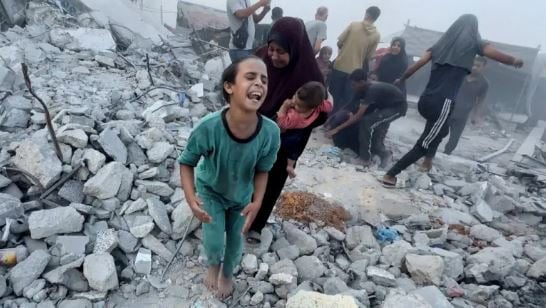Introduction
In the realm of international relations and violent conflict, the situation in Gaza stands as an extraordinary and tragic example of human suffering. The ongoing conflict between Israel and Hamas has resulted in an unparalleled humanitarian crisis, challenging the global community’s capacity to manage such devastation. This editorial delves into the multifaceted aspects of the Gaza conflict, analyzing the political dynamics, humanitarian toll, and international responses, while emphasizing the need for a comprehensive approach to address the enduring crisis.
The Unfolding Humanitarian Catastrophe
In the aftermath of Hamas’s attack on October 7, Israel launched a fierce military campaign against Gaza, purportedly aiming for the complete eradication of Hamas. The repercussions of this offensive have been catastrophic, with the Palestinian Health Ministry documenting over 7,000 deaths in the early stages of the conflict. The credibility of these figures was questioned by President Joe Biden, reflecting a deep-seated skepticism towards Palestinian sources. However, subsequent acknowledgments by the White House confirmed that the death toll had escalated to over 30,000 by March 2024, a testament to the conflict’s severity.
The Gaza Health Ministry, in conjunction with UN agencies like the WHO and the UN Office for the Coordination of Humanitarian Affairs, has been instrumental in tracking casualties. Despite initial doubts, these agencies have consistently corroborated the accuracy of the Ministry’s figures, underscoring the gravity of the humanitarian disaster unfolding in Gaza.
The Magnitude of Destruction and Despair
The scale of destruction in Gaza is unprecedented. As reported by the Lancet, a reputable British medical journal, the conflict has resulted in the deaths of 37,396 individuals by June 2024, with an additional 10,000 feared dead under the rubble of collapsed buildings. The indirect consequences of the conflict are equally alarming, with estimates suggesting that up to 1,86,000 deaths could eventually be attributed to the ongoing crisis due to the breakdown of health infrastructure, widespread malnutrition, and the spread of communicable diseases.
The destruction of critical infrastructure, including desalination plants and healthcare facilities, has compounded the humanitarian crisis. The population of Gaza, already grappling with the psychological toll of prolonged conflict, now faces severe shortages of clean water, food, and medical supplies, further exacerbating their plight.
International Response: A Complex Web of Political Dynamics
The international community’s response to the Gaza conflict has been mired in complexity. While the United States and its Western allies have historically supported Israel’s right to self-defense, the scale and intensity of the current offensive have drawn criticism from various quarters. Organizations like Oxfam have highlighted the disproportionate impact of the conflict on civilians, noting that the daily death toll in Gaza surpasses that of any other major conflict in recent history.
The political dynamics underlying the international response are deeply rooted in historical contexts. Israel, invoking its status as a victim of terrorism, has often operated with a perceived sense of impunity. This has been facilitated by unwavering support from Western democracies, many of which share a colonial legacy and a commitment to Israel’s security. However, the ethical implications of this stance have come under scrutiny, with growing calls for accountability and restraint.
Legal and Moral Imperatives
The legal framework governing international conflict, including institutions like the International Court of Justice (ICJ) and the International Criminal Court (ICC), has struggled to exert influence over the Gaza situation. Despite issuing rulings and arrest warrants, these bodies have faced resistance from both Israel and Hamas, highlighting the limitations of international law in enforcing compliance.
The ICJ’s restraining orders and the ICC’s arrest warrants for leaders of both Hamas and Israel, including Prime Minister Benjamin Netanyahu, have had little tangible impact. Israel’s dismissive attitude towards these legal interventions underscores the challenges of holding powerful actors accountable in a highly politicized conflict.
Humanitarian Imperatives: Addressing the Crisis
Amidst the political and legal complexities, the humanitarian imperatives remain clear. The international community must prioritize the immediate needs of the Gazan population, ensuring access to essential resources and medical care. This requires a coordinated effort involving UN agencies, non-governmental organizations, and donor countries to provide humanitarian aid and support the reconstruction of critical infrastructure.
Additionally, there is a pressing need for a sustainable political solution that addresses the root causes of the conflict. This involves engaging in genuine dialogue, promoting reconciliation, and addressing the legitimate aspirations of the Palestinian people. The international community must leverage diplomatic channels to facilitate a negotiated settlement, recognizing that lasting peace can only be achieved through mutual understanding and compromise.
Conclusion
The humanitarian crisis in Gaza is a stark reminder of the devastating consequences of protracted conflict. As the world grapples with this complex and tragic situation, there is an urgent need for a comprehensive approach that combines immediate humanitarian relief with long-term political solutions. Only through a concerted effort can the international community hope to alleviate the suffering of the Gazan people and pave the way for a more peaceful and just future.

Sunil Garnayak is an expert in Indian news with extensive knowledge of the nation’s political, social, and economic landscape and international relations. With years of experience in journalism, Sunil delivers in-depth analysis and accurate reporting that keeps readers informed about the latest developments in India. His commitment to factual accuracy and nuanced storytelling ensures that his articles provide valuable insights into the country’s most pressing issues.



